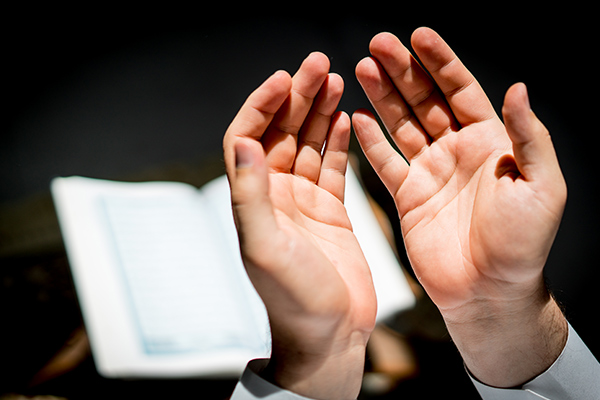
5 Ways to Improve Your Du’a (Supplication)
One of my teachers once told us in class that if we want Allah to speak to us, we should read the Qur’ān because it’s a direct message from Him to us. He added that if we want to speak to Allah, we should turn to Him through prayer (salāh) and supplication (du’ā).
I have always remembered those words, and I see du’ā as a daily opportunity to converse with my Lord. Our Prophet (may peace and blessings be upon him) informed us that du’ā is the crux of worship (Tirmidhī), and that is has the power to change our destiny (Ibn Mājah).
All of us make du’ā in one way or the other, but with the above in mind I’ve put together five ways to really enhance the du’a you make based on Quranic guidance and the Prophetic teachings.
1. Use Allah’s names and attributes
Allah tells us in the Qur’ān: ‘To Allah belong the best names, so invoke Him by them.’ [7:180]
This is more than just memorising the 99 names of Allah. This is about understanding each name and attribute and ‘tailoring’ our du’ā with them. Take for example the name ‘Al-Razzāq’ (The Provider); if you’re in need of provisions, a new job, or a promotion, then this would be the best name and the most suited for your situation. If you’re filled with remorse and are asking for Allah’s forgiveness, then use names such as ‘Al-Ghaffār’ (The All-Forgiving) or Al-Rahmān (The All-Merciful). If you’re seeking a new opportunity or a way out of a difficulty, then call upon Him with ‘Al-Fattāh’ (The One Who creates openings). Like this, you’re now able to connect with Allah through du’ā on a deeper level.
2. Pray in solitude
When Allah describes the famous du’ā made by Prophet Zakariyyā (peace be upon him), He says: ‘When he called out to his Lord a call in secret’ [19:3]
Life is full of distractions. Even when we get home after a long day at work or university, we have plenty to distract us. Sometimes we bring the workload home with us, at other times we have family commitments, or we’re most likely to connect ourselves through the many smart devices we have at home.
When it comes to making du’ā, it’s time to disconnect. Find a time or place that will allow you to make du’ā in solitude with minimal distractions. For example, your ‘quiet place’ may be your room, your basement, or the prayer hall of the masjid. You could be at home but find a ‘quiet time’ such as before going to sleep or immediately after the Fajr prayer at dawn where most people are likely to be sleeping then. That way you can really focus on your du’ā and make it a meaningful one, as opposed to one which is rushed and you’re disengaged with.
3. Expect the best from Allah
Our Prophet told us: ‘When you ask Allah, ask for Al-Firdaus’. (Ibn Mājah)
Al-Firdaus is the HIGHEST level of Paradise. What our Beloved is teaching us here is that when we ask Allah and make du’ā, we should not limit ourselves in what we ask Him for, nor should we set the bar so low.
Whether you’re beseeching Him for something related to the worldly life like your career or family life, or something related to the hereafter such as Paradise or the Prophet’s intercession, you should be seeking the best results and have high hopes in your Master.
What’s the worst that will happen even if your du’ā isn’t accepted? You’ll still be rewarded for asking and following a sunnah, and you’ll at least be given something close to the best even if it isn’t the ‘best’ thing itself. It’s literally a win/win situation for a believer.
4. Make du’ā for others
We learn from a famous hadīth: ‘There is no believing servant who supplicates for his brother in his absence that the Angels do not say: The same be for you too’. (Muslim)
I call this a ‘du’ā hack’ simply because you gain so much when you make du’ā for others. It’s easy to be selfish and focus on yourself throughout (which is a good thing at times), but never forget the people around you. Why not also make du’ā for your parents, your next of kin, your community members, and the ummah at large?
If we make du’ā for them, the angels will automatically make du’ā for us too. Don’t forget that the angels are programmed only to do good, so do you really think their du’as will be rejected? By taking some time out to make du’ā for others, you’re actually benefitting yourself.
Making du’ā for someone in their absence is also a true sign of love. If you were to go out to the mall and remembered your spouse or friend by buying them something, they would really appreciate that. Imagine now in their absence, whether they’ve requested it from you or not, you sacrifice a little bit of time to make a special mention of them in your prayers — they would be thrilled to hear it! After all, wouldn’t you want others to do the same for you?
5. Make du’ā in your own language
I know it sounds simple and almost obvious, but I really have to emphasise this one. Most of the du’ās we’ve memorised in Arabic from the Qur’ān and Ahādīth are great, but the problem is we don’t know what we’re saying for most part, nor do we realise the significance of the du’ā we’re making.
Is that always a bad thing? Not necessarily since we know Allah will appreciate us taking the time out to make du’ā in the first place, and these du’ās have been passed down to us for a reason. However, if you really want to make an effective du’ā, then after you’ve recited the Arabic du’ās which you’ve memorised, you need to switch to your own language. There’s many things that you’re going through, that you need, and that you want to tell Allah which can only be articulated in your first language; be it English, Urdu, or Somali.
By doing so, your du’ā switches from being a routine supplication to becoming a meaningful conversation with Allah Almighty. You’re now able to converse with Him just like Prophet Zakariyyā did when he called out for a child. He explained how he had become old in age, how his wife could not bear a child, how his bones had become weak, and how he desired to have a righteous child. Did Allah not know this? Of course He did, exalted be He, but it was the sincerity and devotion with which Zakariyyā made the du’ā that Allah appreciated the most. It may have seemed impossible for him to have a child at that age, but soon after he received the good news that his du’ā had been accepted and Allah would bless him with a son whose name was Yahyā!
These practical tips are by no means exhaustive as there’s many other ways to enhance your du’ā and make it more effective. If you can begin by implementing a few of these initially, you’ll see a huge difference not only in the feeling you get when making the du’ā, but in the results that will follow too, God willing!
We ask Allah to accept our du’ās and to grant us the goodness of both worlds!


